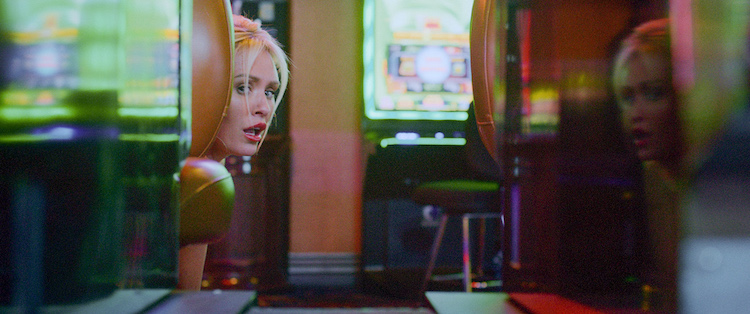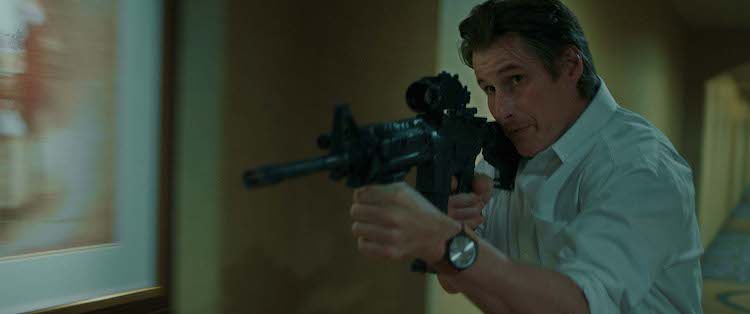Hey, friends! Barbarella here. If you’ve been craving more Dolph Lundgren movies or missing the era where women in films absolutely need men to protect them, The Best Man has both plus more. Brendan Fehr, Luke Wilson, Scout Taylor-Compton, Scott Martin, and Nicky Whelan join Dolph in this story of a resort wedding being taken over by mercenaries, leaving the groom, best man, and their drunk best friend to try and save the day.
I genuinely find it a bit refreshing that the women in The Best Man seem more incapable of protecting themselves than most women in today’s action films. I mean, I love the self-reliant, tough girls who can fight or reason their way out of almost any situation, but we all know that not every woman is that competent. There’s a scale, and some women (and men) fall on the least-likely-to-survive-on-their-own end of that scale. This movie does not shy away from having one female character who would be completely doomed if she didn’t have a man helping and protecting her, and I’m pretty much on board with that decision.
 However, the absolute best decision is having Dolph Lundgren as Anders, the drunken wedding guest. He is incredibly likable, and I find myself just wanting to hang out with him at the bar. Because Anders is a fictional person, I can’t hang out with him, but I did get an opportunity to chat with the film’s director, Shane Dax Taylor. Check it out.
However, the absolute best decision is having Dolph Lundgren as Anders, the drunken wedding guest. He is incredibly likable, and I find myself just wanting to hang out with him at the bar. Because Anders is a fictional person, I can’t hang out with him, but I did get an opportunity to chat with the film’s director, Shane Dax Taylor. Check it out.
Let’s talk budgets. When you’re working on a low budget project, where do you find your money gets the most bang for your buck? Where do you like to put your resources?
“That’s a fantastic question. For this one, when I stepped on, Dolph Lundgren was already on board and Luke Wilson was brought on right when I came on board, so those two right there. We didn’t have a whole lot of shooting days for this, so really just give me the prep time, and then let me choose my stunt coordinator and fight choreographers and things like that so we can really make sure that if we don’t have a lot of money, we can still show you something you haven’t seen before. There’s a lot of action in this film, and it’s hand-to-hand combat. It was important to me to have the prep time before that so we could overcome the challenges of not having a whole lot of money.”

How did you get involved?
“I directed a handful of films before and there was another director on board, and for one reason or another they gave me a call, and I came on board and said, “I’ll do it, but I want to just kind of have my own spin to it.” I’m listed as a co-writer, but I took the concept and kind of made it my own. We put it within this one massive location there so that was a big deal. It was definitely a fun one, for sure.”
It was a beautiful location. Would you talk a little bit about where it was and the pros and cons of shooting there?
“Yeah, it was Inn of the Mountain Gods, which was in Mescalero, New Mexico. The Mescalero Apache tribe owns this land. We shot 100% of the film interior and exterior at that location. They were amazing. I mean, I enjoyed it so much that I just finished a film back there two weeks ago with Malin Ackerman and Amy Smart. I went back there because they were so accommodating. The pros were how easy it was to shoot in this one location and how wonderful the Mescalero Apache tribe is. The cons were we were shooting in a working casino and resort, so it wasn’t like we could shut this thing down. We just had to take everybody and like move [them] over to this side. “We’re gonna shoot this way, but can you stand behind us, but just kind of stay out of these shots.“ That was a blast.”
Dolph Lundgren as Anders is my favorite character in this. He, for me, makes the movie. I just love every scene where he’s drinking, which is most of it, right? What did he bring to that character that maybe wasn’t on the written page?
![[L-R] Luke Wilson as Cal, Nicky Whelan as Brooke and Dolph Lundgren as Anders in the action film, THE BEST MAN, a Saban Films release. Photo courtesy of Saban Films. [L-R] Luke Wilson as Cal, Nicky Whelan as Brooke and Dolph Lundgren as Anders in the action film, THE BEST MAN, a Saban Films release. Photo courtesy of Saban Films.](https://media.aintitcool.com/media/uploads/article_images_2022/barbarella/the_best_man_3.jpg) “For him, he’s always the toughest guy in any room he’s ever in, in any movie he’s ever in, and I wanted to make him…I didn’t want him to be this one-man wrecking crew. He’s drunk throughout, for the most part, so I wanted to just to have him there, and when he takes a punch, he’s drunk, he’s at six or seven. I said, “Dolph, I wanna make you vulnerable and funny and likable and just not the terminator coming in and doing this stuff.” That was important to me. He’s directing now too, a lot. As a director [on] my first action film, to be able to talk to him about certain scenes and how they could be shot action-wise, I mean he can’t even count how many action films he’s done so to have that resource right there on set and ask him and talk to him about it [was incredible], but also he takes his lumps in this one and he gets bloodied, and it was important to me to show that side of him, that he’s vulnerable that he gets punched, and it hurts like it would hurt anybody, and not just brush it off like we’ve seen in other action films that he’s done.”
“For him, he’s always the toughest guy in any room he’s ever in, in any movie he’s ever in, and I wanted to make him…I didn’t want him to be this one-man wrecking crew. He’s drunk throughout, for the most part, so I wanted to just to have him there, and when he takes a punch, he’s drunk, he’s at six or seven. I said, “Dolph, I wanna make you vulnerable and funny and likable and just not the terminator coming in and doing this stuff.” That was important to me. He’s directing now too, a lot. As a director [on] my first action film, to be able to talk to him about certain scenes and how they could be shot action-wise, I mean he can’t even count how many action films he’s done so to have that resource right there on set and ask him and talk to him about it [was incredible], but also he takes his lumps in this one and he gets bloodied, and it was important to me to show that side of him, that he’s vulnerable that he gets punched, and it hurts like it would hurt anybody, and not just brush it off like we’ve seen in other action films that he’s done.”
I love him. He’s like the one guy I would wanna hang out with at any wedding reception or any kind of thing at the bar. That character is so great.
“It is, and you know total side-note, my family owns the company [that makes the] bourbon he’s drinking, so it was like this shameless promotion. I was just going to have him have a glass, and he’s like “No, I’m gonna take the whole bottle and go drink it at the slot machine.” I was like, “Okay, well my family thanks you.””
![[L-R] Scott Martin as Axel and Nicky Whelan as Brooke in the action film, THE BEST MAN, a Saban Films release. Photo courtesy of Saban Films. [L-R] Scott Martin as Axel and Nicky Whelan as Brooke in the action film, THE BEST MAN, a Saban Films release. Photo courtesy of Saban Films.](https://media.aintitcool.com/media/uploads/article_images_2022/barbarella/the_best_man_5.jpg)
I want to talk a little bit about you. You’re a Kentucky boy who moved to LA. What was that transition like?
“I was at ESPN for a long time, so I kind of traveled the world and did documentaries, and then I always told ESPN that I was gonna get out and direct features and that was kind of important to me. Having visited there a lot for sporting events, I was well aware of the city, but it was important to me to get there. The person that brought me initially to LA when I was at ESPN was Shane Black. I was fortunate enough to meet him, and he was like “Come live with me. Come live on my couch. I’ll help you because I can see how passionate you are.“ I was fortunate again to meet David Gordon Green and other directors and could pick their brains, so when I made the transition from producing live sporting events and documentaries to feature films, it was pretty - I don’t wanna say seamless - it was easier than most. I didn’t show up at nineteen.
“I was out there for twenty-something years. I just moved back to Kentucky. I have three young daughters, and we moved back to Kentucky about a year ago, so that’s been a good transition. I’m doing documentaries here and other things, I’ve definitely always been a Kentucky boy at heart, for sure.”
I feel like we continue to learn throughout life. What did you learn while working on The Best Man?
“It’s really just evolving as a director. I’ve never done action before, but I grew up watching action films. I’ve had action sequences in films but never just a full-on action film. It was important to me to do that, but also I don’t just go from action to action to action. I have to have a scene with Dolph and Luke in a bar. Let’s get to know these people before we put them through the ringer, and that was important to me. If I had directed an action film first off the bat, I think, it would’ve been [like] Rambo. He doesn’t even bleed really; he just goes through and does these things. That was important to me to humanize these action films, and it’s things you just kind of learn as you go. I’ve been fortunate now to have directed seven or eight films. I definitely enjoy it, for sure.”
Shane Dax Taylor’s action film debut The Best Man will be in select theaters, on demand and digital April 21, 2023. Check out the trailer!
